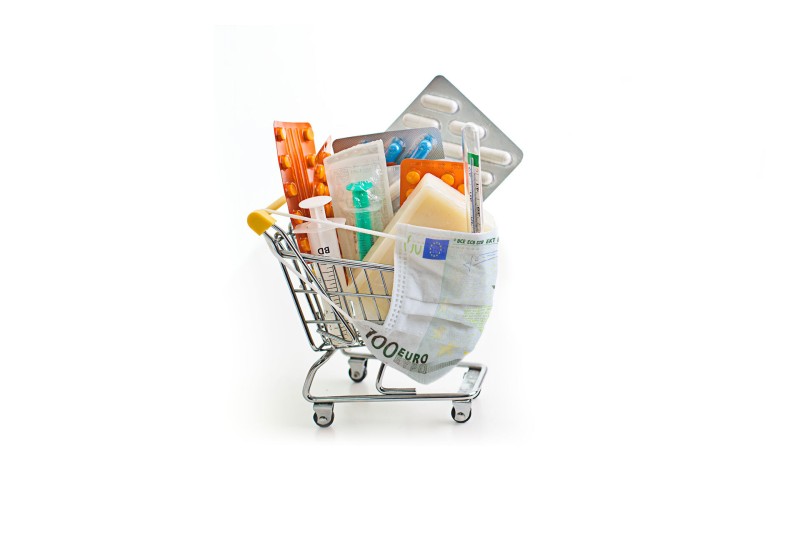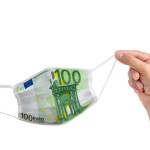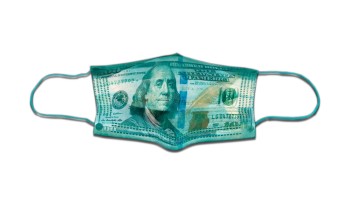In a phone call late last month, an Estonian minister begged a journalist to keep quiet about the details of a large shipment of surgical masks headed for the country.
The contract had already been signed, Minister of Public Administration Jaak Aab explained. But on more than one previous occasion, supposedly done deals had evaporated after other countries offered higher prices, snatching crucial COVID-19 supplies away.
“Deliveries are being hijacked,” Aab said in public. “The United States … is ready to pay double.” In private, he pleaded for secrecy, at least until the goods were physically in hand. The government would share everything once the crisis was over. Then, the minister said wryly, “you can crucify me for this phone call.”
The journalist, OCCRP editor Holger Roonemaa, had been hoping to find out how much gear had been ordered, when it would arrive, and who the government had bought it from. It was the largest purchase of COVID-19 supplies he had seen in Estonia, a country that was then on the verge of running out.
But a government that prides itself on transparency had become unusually tight-lipped. Instead of publishing information about upcoming tenders in advance online, agencies were buying supplies from vendors directly and on the fly. Roonemaa’s freedom-of-information request about the 11-million-euro deal went unanswered.
Similar scenarios are playing out across the continent.
Under pressure to quickly procure medical supplies for their nervous populations in the midst of a worldwide pandemic, many European countries are forgoing procedures designed to ensure that government purchases are transparent, efficient, and free of corruption.
The usual practice for government agencies that make purchases is to ask for bids in advance, find multiple applicants, and select the best vendors by applying strictly regulated criteria. For transparency, the details are published on open internet portals.
These precautions — especially the emphasis on openness and transparency — are considered crucial by advocates for good governance. Government purchases account for close to a third of state spending in high-income countries, and a RAND study found that corruption in this area could cost EU taxpayers $5 billion per year.
But now, country after country is making use of exceptions that allow essentially all of these measures to be skipped. In a chaotic fashion that journalists and transparency advocates have scrambled to follow, agencies as large as entire ministries or as small as individual towns are buying medical equipment from suppliers directly, often verbally, requiring no bids and publishing little or no information about what’s happening.
The rationale behind the streamlined purchasing procedures — speed above all else — is obvious. At a recent virtual meeting about combating fraud in procurement, one specialist summed up the argument.
“When the going gets tough ... strict compliance with existing legal frameworks, at the very least, takes a backseat,” said Aris Georgeopoulous, a law professor at the University of Nottingham and member of its Public Procurement Research Group. “That goes not only for procurement, but also with anti-corruption enforcement. Perhaps now is not the time to vigorously apply all the existing tools that we have.”
Other participants noted that, in an overheated market where legitimate stocks of medical supplies were snatched up as quickly as they were offered, buyers had little choice but to try to make deals quickly and directly.
But in more than one case, COVID-19 procurements have benefitted people with questionable credentials or even criminal histories. In Italy, the European country hardest hit by the pandemic, OCCRP reporters found that state contracts were awarded to companies whose heads had been accused of fraud and misappropriation of public funds. In neighboring Slovenia, the government’s largest COVID-19 contract, worth more than 25 million euros, went to a gambling mogul with no known experience in medical procurement. And in Romania, a major new supplier of face masks is controlled by a former public official who has been convicted of colluding with a violent organized criminal group.
The Slovenian Gambling Mogul
Joc Pečečnik, one of Slovenia’s wealthiest men, has long been a mainstay of the country’s gambling industry. One of his main lines of business producing and selling gaming devices in the U.S. state of Nevada. Public records don’t show any involvement in health care.
Transparency advocates recognize that the urgency of the moment leaves no time for cumbersome bureaucracy. But they worry that the secrecy will continue long past the present moment, making it more difficult to discover whether the COVID-19 procurements being signed in these days and weeks were clean and honest.
“Monitoring by journalists and civil society is absolutely essential, because otherwise, how do we know that the rules are being complied with?” says Helen Darbishire, executive director of the transparency advocacy group Access Info Europe. “The obligations on states to inform the public about all areas of their activity persist.”
“Swift and Smart”
What the EU member states are doing is not against the rules. Measures to reduce bureaucracy in an emergency are foreseen in the European Union’s procurement directive, a kind of supra-national law that governs how member states are supposed to purchase goods and services.
On April 1, the European Commission issued a "guidance" document encouraging countries to take advantage of these measures. The text, which calls for “swift and smart solutions” to the COVID-19 crisis, reminds member states that they can use an emergency measure called a “negotiated procedure without prior publication” to buy urgent supplies.
In this mechanism, the document explains, “there are no publication requirements, no time limits, no minimum number of candidates to be consulted, or other procedural requirements. No procedural steps are regulated at the EU level.”
Essentially, this allows any government body in any EU member state to make purchases from vendors directly, even by phone, skipping the usual good-governance measures and facing no requirements to make the information public at the time of procurement. In its own instruction manual for procurement specialists, the European Commission warns that this extraordinary procedure constitutes a “significant derogation from the core principles of openness, transparency and competition.”
For that reason, its usage is governed by strict criteria (see box). The European Commission notice warns that every time the new procedure is used, the reasons must be justified in a subsequent report, called a “contract award notice,” due within 30 days of a contract’s conclusion.
At the time of this article’s publication, several dozen of these notices had been published on the European Commission’s online portal. But other than the size of the contract and the name of the vendor, little information is supplied. The section meant to include the contracting authority’s justification for using the extraordinary procedure typically includes few specifics. A Romanian contract to buy medical equipment, for example, simply states that it is “needed … to support and treat the critically ill patients infected with the virus.”
The extent to which this information is being systematically posted on national procurement sites, or otherwise made available locally, is unclear. The specific situation appears to vary from country to country. Anecdotally, getting any information at all appears to be nearly impossible from some agencies.
In an atmosphere of crisis, some in the procurement field sense a general loosening of standards. “The main focus is getting the supplies,” says Rachel Hanna, a researcher at Access Info Europe. “No one’s talking about making it transparent … the [European] Commission is being so flexible, saying ‘do what you can.’ We’re going to see a lot of vague [procurement] publications.”
To make matters still murkier, many countries have suspended freedom of information laws for varying periods, depriving journalists and transparency advocates of an important investigative tool. The bloc has no directive or requirement for the maintenance of such laws.
Buy, Then Verify?
The risk of waste or fraud is especially high when desperate procurement agencies compete with each other to find scarce supplies in a chaotic market. Gian Luigi Albano, a division head at Italy’s procurement agency, Consip, warned that procurement was especially challenging in an environment rife with price gouging. He shared Italian data showing that the price of medical masks had shot up from 5 to 130 euros per kilogram of material. Meanwhile, in the United Kingdom company registry, dozens of new firms with names related to COVID-19 have registered in the last few weeks.
These circumstances are ripe for exploitation, by both unscrupulous vendors and officials who might be tempted to award inflated contracts to friends or business partners.
“We don’t have very good rules on transparency of … what extent certain businesses are undertaking lobbying,” says Darbishire of Access Info Europe.
“To what extent was the contract given to this supplier or that, not because of any objective criteria ... but because the CEO of the company went and talked to the minister?” she asks. “What kind of minimal due diligence did you do to choose your provider?”
Keeping in mind the logistical challenges of the crisis, her organization is seeking as much information as possible on the decisions currently being made — if not now, then later.
“Obviously, with emergency procurement … we understand that there’s no transparency of the bidding procedure, because there is no bidding procedure,” says Hanna, Access Info Europe’s researcher. “But that doesn’t mean we don’t have a transparent process after.”
“We want to have the justifications online, the contracts online, what exactly was paid, and why that economic operator was chosen.”
This is particularly important since EU regulations make clear that the special procurement procedure is meant only to “cover the gap” until more regular processes can resume. With the future course of the epidemic unclear, access to procurement data by journalists and advocates will be needed to ensure the crisis is not exploited to justify unrelated or even criminal spending.
The Troubles Begin
Investigative reporters have already uncovered significant problems.
OCCRP’s Italian member center, IRPI, reported on April 4 that two state contracts in Italy were awarded to men previously accused of fraud and misappropriation of public funds.
In one case, the company’s head had been charged with creating fictitious businesses to obtain state subsidies. The other businessman was charged with e-commerce fraud after accepting payment from customers for bulk purchases of consumer goods and delivering nothing. Both men have maintained their innocence.
A representative of Consip, the Italian procurement agency, told the outlet that purchasing orders would only be issued after stringent vetting. Four days after the initial report, Consip voided one of the deals.
The two problematic contracts were discovered because Consip did publish the award notices on its electronic portal.
“For the central authority, transparency is not the problem,” says Matteo Civilini, an IRPI reporter. “But some of the regional authorities, and the Lombardy one, are not very transparent at the moment. … They haven’t published the names of the companies. They just said, ‘We’ve done these tenders for this amount of money, for this kind of product’ — but it’s very limited information.”
In Romania, too, advocates seeking to track government COVID-19 purchases have been stymied by a lack of access.
A presidential emergency decree from March 16 allowed certain authorities to make direct purchases of medical supplies outside of normal procedures. The country’s procurement agency, ANAP, initially stipulated that those who do so must submit a limited set of information to the agency within 30 working days.
But Elena Calistru, the head of transparency organization Funky Citizens, says that the result has been confusion. “The draft emergency ordinance was supposed to prolong the number of days that an authority has [to publish] what they’ve bought. This made things worse, because a lot of authorities understood that maybe it’s fine not to publish the data.”
After public criticism from advocates, including Funky Citizens, the draft ordinance was scrapped.
But violations are unlikely to lead to serious consequences. “The administrative fee for not publishing the information is very low,” Calistru says. “And I doubt that ANAP has the capacity to monitor all the authorities to see if they’re doing it.”
The result is that “it’s almost impossible to know exactly how many [government buyers] have actually published everything they’ve procured.”
“Journalists ... have been requesting data,” she says, “and there were numerous examples of being denied access to information. There were whistleblowers from hospitals talking about contracts that were not visible anywhere.”
Just days ago, OCCRP, along with its Romanian member center, RISE Romania, reported that a company called BSG Business Select had received, and already fulfilled, a government order worth over 860,000 euros for masks and protective suits. The contract was concluded through a direct, no-bid procedure.
BSG, which was originally set up to practice aromatherapy, crystal therapy, and other alternative health treatments, purchased the equipment in Turkey for 614,400 euros, turning a quick profit of over 40 percent.
But health workers have derided the masks as being of poor quality. Moreover, corporate records show that on March 11 — the same day the World Health Organization declared the coronavirus a global pandemic — a majority stake in BSG was purchased by a former civil servant described as having a “close relationship and unbreakable friendship” with the country’s prime minister. She had also previously been convicted of paying off a violent criminal group to push a minibus taxi service out of its commuter route so she could take over.
Back in Estonia, in spite of Minister Aab’s fears, several additional shipments of medical supplies have arrived, and there is no longer any immediate fear of shortages. But although Roonemaa has filed two additional appeals for the information about the order, he has still not heard back.
With reporting by Holger Roonemaa, Anuška Delić, Matej Zwitter, Ana Poenariu, and Sylke Gruhnwald.




